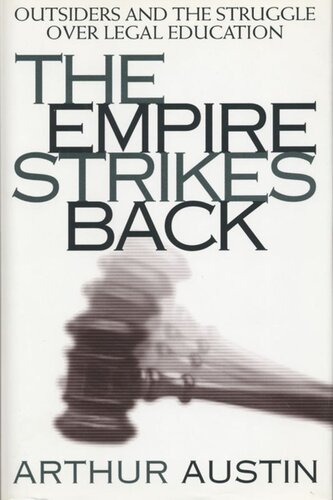

Most ebook files are in PDF format, so you can easily read them using various software such as Foxit Reader or directly on the Google Chrome browser.
Some ebook files are released by publishers in other formats such as .awz, .mobi, .epub, .fb2, etc. You may need to install specific software to read these formats on mobile/PC, such as Calibre.
Please read the tutorial at this link: https://ebookbell.com/faq
We offer FREE conversion to the popular formats you request; however, this may take some time. Therefore, right after payment, please email us, and we will try to provide the service as quickly as possible.
For some exceptional file formats or broken links (if any), please refrain from opening any disputes. Instead, email us first, and we will try to assist within a maximum of 6 hours.
EbookBell Team

5.0
58 reviewsOnce dismissed as plodding and superfluous, legal scholarship is increasingly challenging the liberal white male establishment that currently dominates legal education and practice. The most significant development since the emergence of the casebook, at the turn of the century, this trend has unleashed a fierce political struggle. At stake is nothing less than the entire enterprise of law and education, and thus a powerful platform from which to shape society.
The result, here vividly recounted by Arthur Austin, has been an uncompromising, take-no-prisoners fight for dominance. The challenge comes from Outsiders, a collection of feminists, critical race theorists, and critical legal studies scholars who rely on unconventional methods such as storytelling to give voice to the underrepresented. In the other, demographically larger camp resides the monolithic Empire, consisting of traditionalists who, having developed an effective form of scholarship, now circle the wagons against the outsider heathens.
Neither partisan nor objective, Austin is both respectful and critical of each faction. The Empire, he believes, is imperious, closed-minded, and self-perpetuating; the Outsiders are too often paranoid, anti-pragmatic, and overly tolerant of fringe work. Is the new scholarship a vacuous, overpoliticized, soon-to-be-vanquished trend or the harbinger of an important new paradigm? Is reconciliation possible? Anyone with a vested interest in the answer to these questions, and in the future of law, cannot afford to miss Arthur Austin's invaluable volume.
Arthur Austin is the Edgar A. Hahn Professor of Jurisprudence at Case Western Reserve University.